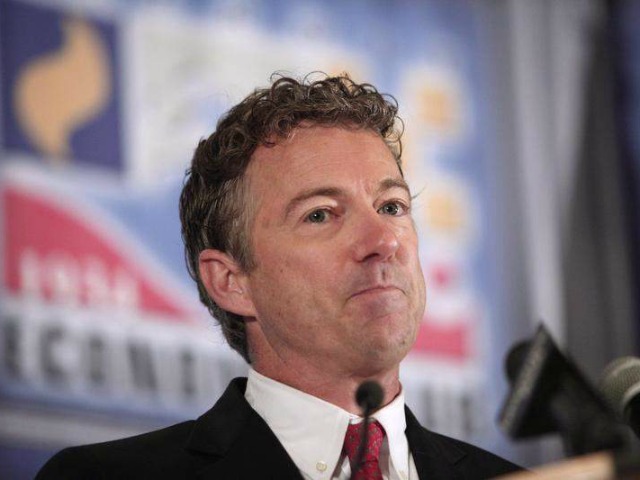An ironic trait of non-interventionists is how much they overestimate America’s impact abroad. It is something they share with many foreign opponents of U.S. power. It is also a fundamental assumption of Sen. Rand Paul’s foreign policy.
Last week, Paul boasted in an op-ed about a previous op-ed in which he pondered if the ouster of Syrian dictator Assad would actually encourage instability. At issue was whether the United States should have supported Syrians opposing the dictator Bashar al-Assad.
Writing with hindsight in the royal third person, Paul warned, “we would caution that arming the Islamic rebels in Syria created a haven for the Islamic State.” With his trademark use of mendacity and false choices, Paul added: “We should realize that the interventionists are calling for Islamic rebels to win in Syria and for the same Islamic rebels to lose in Iraq.”
Actually, those who argued for doing something in Syria wanted to arm secular rebels, not Islamists. The idea was these non-Islamist rebels could confront Assad–who has much American blood on his hands–and also keep the jihadists out. This fact is something Paul must have known from his position on the Senate Foreign Relations Committee, but chose to forget in this instance.
But more telling is Paul’s belief that America is somehow to blame for the creation of the Islamic State despite having done next to nothing in Syria and withdrawing from Iraq. Paul ignores the real cause: Iranian support for Assad allowed him to kill off secular rebels while the jihadists who would become ISIS and later the Islamic State took advantage of the maelstrom–and our inaction.
In blaming America, Paul also ignores that Islamism–the political force that seeks to unify mosque and state in a theocratic tyranny–was reasonably well contained in the century since the modern Middle East emerged. Exceptions to this trend occurred when America and its allies refused to defend their interests forcefully, such as during the Islamists’ takeover of Iran in 1979, the lead-up to the 9/11 attacks, and today’s broad collapse of our interests abroad.
Paul does not limit his belief in American culpability to the Middle East. As Russian President Vladimir Putin began his move on Crimea after months of Moscow-induced political crisis in Ukraine, Paul said, “Some on our side are so stuck in the Cold War era that they want to tweak Russia all the time and I don’t think that is a good idea.” He added that, “I think we need to have a respectful–sometimes adversarial–but a respectful relationship with Russia.”
Notwithstanding his senatorial caveat, the unmistakable implication of this statement is that Paul believes America’s “tweaking” of Moscow is at least partly to blame for Russia’s invasions and subversions abroad. In Paul’s world, Putin is driven to act by the United States, rather than a more probable quest for personal power or the age-old Russian desire to dominate Europe and punish nations that attained the wealth and stature that somehow continue to evade Russia.
Missing from Paul’s inclination to blame America for the world’s threats is any real policy to mitigate those threats. It is easy to critique U.S. actions in the Middle East and elsewhere; presidents of both parties have made serious mistakes. But even if one accepts Paul’s implicit assumption that American power is the cause of problems, what exactly does a libertarian army do to keep America safe?
Speaking last January, Paul said, “I really am a believer that foreign policy must be viewed by events as they present themselves, not as we wish them to be.” This is standard language used by foreign policy realists in opposition to those who would like to shape foreign political realities. But what Paul then offered was anything but realistic: “The Syrian chemical-weapons solution could be exactly what we need to resolve the standoff in Iran and North Korea. By leveraging our relationship with China, we should be able to influence the behavior of North Korea. Likewise, we should be engaging the Russians to assist us with the Syrians and the Iranians.”
All of these ideas have been tried and all of them have failed–including the Syrian disarmament agreement that Paul venerates. Unlike Paul, these hostile foreign actors actually are realists, which means they won’t be sweet-talked out of what they see as their personal and national interests, including their aggressive military postures, weapons of mass destruction, support of their evil allies, and desire to challenge America and the civilized order in the world it represents. American diffidence and withdrawal only make these problems worse.
In the real world where American power is not the cause of our problems, modern presidents of both parties have used our national power judiciously but forcefully to confront threats abroad. At least they often did up to the current president, whose de facto non-interventionism offers a preview of what Rand Paul’s foreign policy would produce.
Christian Whiton is the president of the Hamilton Foundation and the author of “Smart Power: Between Diplomacy and War.” He was a State Department senior advisor during the George W. Bush administration.

COMMENTS
Please let us know if you're having issues with commenting.